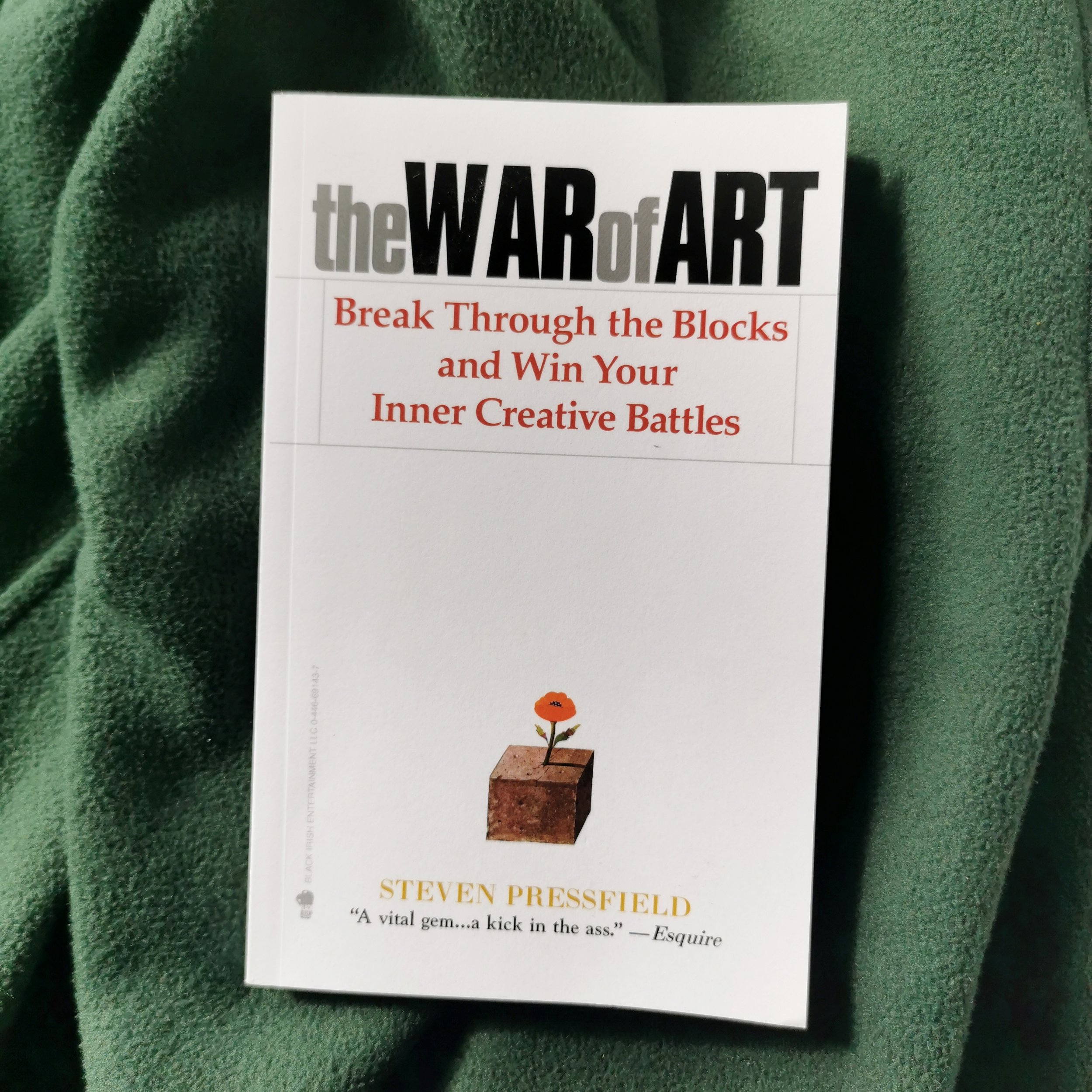The War of Art - Steven Pressfield
3-Sentence Summary:
What holds most people back from pursuing their artistic, professional, lifestyle, or other, goals is Resistance.
Resistance can manifest as fear, procrastination, addictive behaviours, negative self-talk, depression, and ultimately not doing the work required to move towards becoming your best self and living the life you want to live.
Resistance can be overcome by 'becoming a professional': showing up every day no matter what, doing the work in spite of fear, self-doubt, and rationalisation that you should be doing something else, delaying gratification, and doing this consistently, knowing that through doing so, inspiration will follow and that you will contribute your unique work to the world.
Notes:
It's not doing the work (writing for example) that's hard. It's sitting down to do it. What stops us from sitting down to do it can be called "Resistance".
Resistance holds us back from living our unlived life, and can therefore be toxic, if not dealt with properly.
Resistance can be experienced in any calling including writing, painting, creating music, pursuing business ventures, starting a diet or training plan, beating addiction, education, relationships, and moral or religious change.
Resistance's aim is to distract you from doing your work.
The more important your calling is, the more resistance you will feel.
Everyone feels resistance, and it doesn't go away with experience.
Resistance only obstructs you from moving in a positive direction, so can be used as an indication that you should move towards the work for which you are experiencing Resistance.
Resistance is most powerful the closer you get to finishing the project.
Resistance can come in the form of other people telling you, explicitly or implicitly, that you shouldn't be pursuing the goal.
Procrastination is the most common manifestation of Resistance. You may start to think you need to wait for the perfect time or wait until you sort out another aspect of your life. This procrastination needs to be overcome or it can become a habit.
Resistance can come in the form of self-destructive habits like addiction, a victimhood mentality, and choosing to be around people who you deep down know will let you get away with not becoming your best self.
If you let it take over, it can ultimately result in unhappiness, boredom, lack of satisfaction, and even depression.
Criticism of others, self-doubt, and fear are common indicators that you are experiencing Resistance.
Rationalisation is the right-hand man of Resistance, and there will always be a way to rationalise not doing your work.
Overcoming Resistance requires you to become a professional. "I write only when inspiration strikes. Fortunately, it strikes every morning at nine o'clock sharp."
Turning professional requires:
1. Showing up every day.
2. Showing up no matter what.
3. Staying on the job all day.
4. Committing over the long haul.
5. Keeping the stakes high and real.
6. Accepting remuneration for your labour.
7. Not overidentifying with your job.
8. Mastering the technique of your job.
9. Having a sense of humour about your job.
10. Receiving praise or blame in the real world.
The professional does it for the love of the game, not just for the money.
The professional uses delayed gratification, rather than getting overly enthusiastic at the start and stopping when the entusiasm wanes.
The professional has some distance from the work, not identifying with the work, or its success or failure, but rather seeing it as an instrument, from which he/she is seperate, but must master the technique of playing.
You can even think of yourself as an employee of “You Inc.”, meaning that you are a worker in this enterprise, rather than being the enterprise itself.
You can't wait for inspiration (or the Muse) to show up. You must act as a professional and the inspiration will come.
Resistance feeds on fear. On the surface, it's the fear that you will fail, be unhappy and miserable, and ultimately, die. But the real fear is that you will succeed, because then you will have the responsibility of living up to this ideal.
An artist should not define himself/herself hierarchically, competing against others and evaluating happiness based on rank. But rather he/she should think territorially, owning the space that is uniquely yours, and working to grow it.
A 'hack' condescends to his/her audience, asking not "What do I want to write?", but "What is the market looking for?".
"You have the right to your labour, but not to the fruit of your labour". You must do the work for its own sake, and allow the chips to fall where they may in terms of money and praise.
Creative work is not a selfish act, but a gift to the world, and you shouldn't rob the world of your contribution.
If you enjoyed this summary, you’ll probably enjoy the full book. Get it here: LINK TO BOOK (AMAZON)
Or get it for free on audiobook when you sign up for an Audible account: LINK TO AUDIOBOOK (AMAZON)
(This website uses amazon referral links as part of the Amazon Associates program.)
